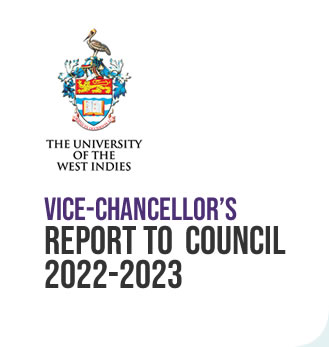CENTRE REPORTS
Office of Finance

The academic year 2023/2024 marked the second year of The University of the West Indies’ (The UWI) strategic plan spanning from 2022 to 2027. Throughout the year, the Office of Finance and Campus Bursaries focused on prudent management of The UWI’s resources to bolster the institution’s financial health. The ongoing financial support from Contributing Governments, despite economic challenges, was greatly valued and acknowledged, alongside the trust students placed in The UWI for their higher education pursuits.
Despite these efforts, The UWI faced significant funding challenges, specifically due to delays in financial contributions from some governments and students. To improve its financial situation, The UWI sought innovative funding initiatives and strategic partnerships while enhancing its entrepreneurial activities. The institution also expanded its range of online and full-fee- paying programmes and implemented additional cost containment measures to sustain its financial viability.
Financial Performance Overview
The audited financial statements for the year ending July 31, 2024, revealed that The UWI operated at a deficit of BDS$14.5 million, a notable improvement from a BDS$37.2 million deficit in 2023. This improvement occurred despite finance costs, depreciation, and post-employment pension and medical benefits expenses. When excluding these costs, the operational surplus increased by 66% to BDS$77.2 million, compared to BDS$46.4 million in the previous year.
Regarding comprehensive income, The UWI recorded a net loss of BDS$24.8 million. This loss was influenced by a currency translation gain of BDS$6.8 million and an actuarial re-measurement loss of BDS$30.5 million linked to post-employment pension and medical benefits liabilities. The latter was primarily due to decreased discount rates for calculating these liabilities. Furthermore, a loss of BDS$1.1 million was noted from changes in the fair value of debt instruments. Ultimately, total comprehensive income reflected a loss of BDS$39.3 million, a significant increase from a loss of BDS$21.7 million in 2023.
In terms of revenues, The UWI reported total income of BDS$ 923.7 million, marking a 7% increase from BDS$ 860.9 million the previous year. This income was derived from various sources: government contributions accounted for 48% (BDS$439.4 million), tuition and other student fees comprised 14% (BDS$132.1 million), special projects contributed 29%, commercial operations offered 5%, and other income represented 4%. Notably, there was an 8.8% increase in government contributions, underscoring its critical role as the primary income source.
Despite this, The UWI experienced a slight decline of 1.3% in student enrolment compared to 2023. Tuition fees saw increases, with Mona Campus rising by 6.0%, Cave Hill by 1.6%, and the Global Campus experiencing varying increases. Rates remained unchanged at the St Augustine and Five Islands Campuses.
The increase in income from commercial operations was noteworthy, with a 6.7% rise compared to 2023. This indicates that campuses and the University Centre were active in revenue- generating activities corresponding to the Strategic Plan’s revenue generation phase. Other sources of income also increased by 7.2%.
Expenditure Analysis
Total expenditures for The UWI were recorded at BDS$ 938.2 million, representing a 4.5% rise from BDS$ 898.1 million in 2023. The breakdown of expenditure categories included:
- Departmental (45%),
- Administrative (15%),
- Central (14%),
- Special and Other Projects (21%), and
- Commercial Operations (5%).
The primary factors contributing to the financial deficit included post-employment pension, medical benefits expenses, and impairments. As per independent actuarial evaluations, the total costs for post-employment benefits in 2024 were assessed at BDS$41.2 million, up from BDS$36.6 million in 2023. This increase highlighted the ongoing financial impact of unfunded pension liabilities.
Impairments accounted for BDS$ 5.5 million of the overall deficit as required by International Financial Reporting Standard (IFRS 9).
In summary, The UWI made notable strides in financial management amid considerable funding challenges and rising costs. The operational surplus and income generation improvements from various sources reflect a commitment to sustainability and adaptability, aligning with the goals outlined in the strategic plan. While financial deficits remain a concern, particularly due to pension obligations and impairments, ongoing innovations and strategic initiatives are expected to drive future financial health and academic excellence.

Hybrid 2024 Meetings of the Technical Advisory Committees (TACs) and University/Campus Grants Committees.


